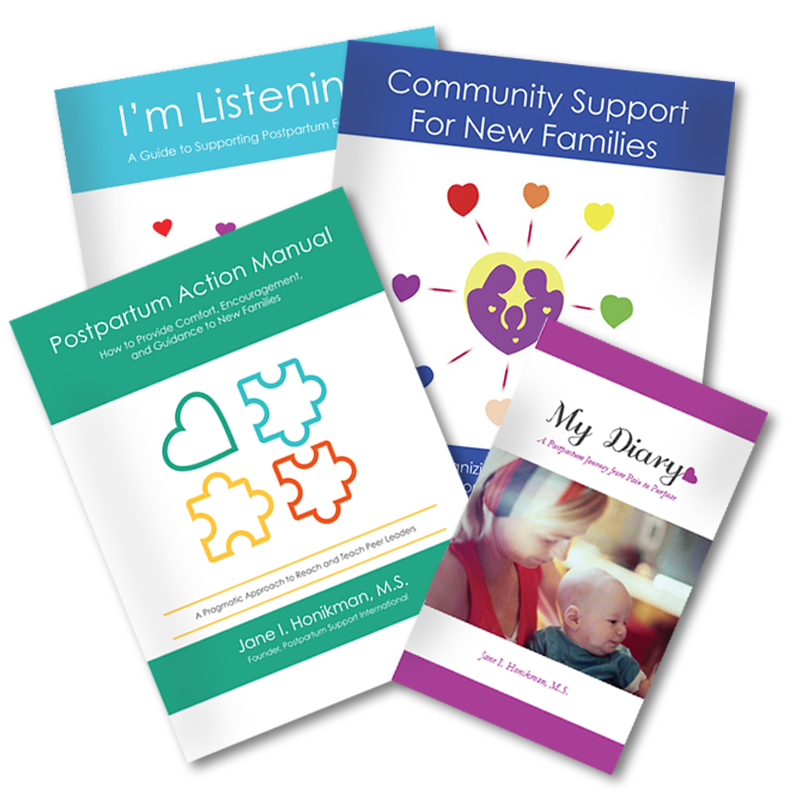By Jane I. Honikman, MS
Seven Strategies to Offer Comfort, Encouragement and Guidance
I have been hearing the voices of new fathers since I became a mother myself, however, I wasn’t always listening. The first postpartum male voice I heard was that of my husband. Breastfeeding was not going well. He expressed exasperation, desperation and fear by saying, “you’re starving our baby”. I received lactation help but there was no emotional support for him.
Years later I facilitated a new parent’s discussion group. A new father expressed his irritation and frustration about his role by saying, “Stop criticizing how I’m putting on the diaper”. This time I began to listen.
I answered a phone call to the Warmline from a father. He cried while sharing that his wife and mother of their infant had filed for divorce and custody. He had no idea what had happened to his marriage. I actively listened to his tragic story. There were no local resources for him.
I heard a man tell how he had accompanied his girlfriend to the first ultrasound appointment. The technician turned her back on him, spoke only to the woman. He felt left out and ignored.
The needs of postpartum fathers have been marginalized. There are few, if any, resources designed to include the father-to-be during pregnancy and after the arrival of the infant. What I’ve learned by listening to husbands and fathers is that we must embrace these gaps. The strategies I used will help you too.
1. Give acknowledgement
The fact is an egg requires a sperm for pregnancy. Nature takes over the woman’s body so naturally she becomes the focus of attention. What about the “pregnant” man? Who listens to his joys, and fears?
2. Pay attention
Anthropologists have observed in some cultures a male experience of pregnancy called “couvade.” Some men exhibit somatic symptoms that are overlooked and misinterpreted. We need to pay attention to the medical needs of men too.
3. Ask thoughtful questions
The pregnant couple is transitioning from being a duo to parenthood. As individuals and together they are entering a new phase of life. This journey is scary as well as exciting. They are facing challenges, decisions and fears. Pregnancy is a time to have conversations. Who will provide a safe environment where they can talk, cry and won’t be judged?
4. Know the truth
Having a baby is hard on relationships and marriage. Statistics challenge the hope that the addition of a baby will preserve or even improve partnerships.
5. Men have hormones too
There may be hormones that prepare men for fatherhood. Studies are limited but perhaps men who are exposed to a pregnant partner may have hormonal changes. Where is the research on the fathers?
6. Watch for depression
Statistically, rates of postpartum depression are the same in fathers and mothers. We know who is at risk. It is essential to be frank about personal and family histories of mental illness. There is no shame acknowledging the truth. Stigma dos nothing but keep one from getting help.
7. Keys for wellness
Fathers and mothers need to sleep, eat well, exercise, have time for themselves, share their emotions and get support. Pregnancy and the postpartum period wreck routines. It is not easy to accept help but it is a foundation for successful parenting and wellbeing.
The role expectations for men as husbands and fathers has changed dramatically during my lifetime. My father never changed a diaper. His role was as the provider and protector. My husband, in contrast, was emotionally invested in our pregnancies and his role as an involved father.
Parental mental health is the “new” social movement. Contrary to current thinking, pregnancy and postpartum issues should not be labeled as gender specific. Our children will benefit from listening to the needs of both parents.


